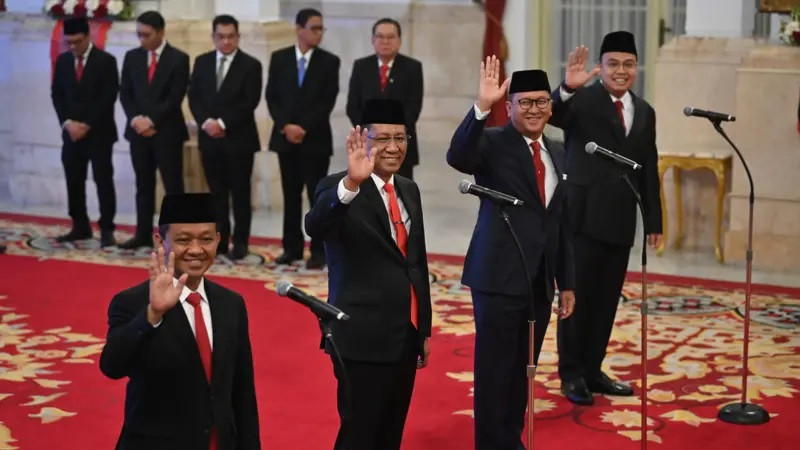Popular Reads
Top Results
Can't find what you're looking for?
View all search resultsPopular Reads
Top Results
Can't find what you're looking for?
View all search resultsJokowi’s quest for survival
The President has again shuffled his cabinet a little over two months until he steps aside, signaling his alignment with Prabowo's incoming government in perhaps his final bid to retain power.
Change text size
Gift Premium Articles
to Anyone
P
resident Joko “Jokowi” Widodo may deny that he had a hand in the sudden, recent resignation of Airlangga Hartarto as Golkar Party chair, just as he dismissed suggestions that he was seeking the chairmanship of the Indonesian Democratic Party of Struggle (PDI-P), but the political dynamics over the past few weeks have been undeniably building up to a new political vessel for the outgoing President.
This ensures that Jokowi will still wield some control over the incoming government of president-elect Prabowo Subianto, even after the transition of power in October.
For example, the cabinet reshuffle on Monday obviously has nothing to do with the performance of sitting ministers, since very little can be expected from a cabinet that will depart along with the President in two months.
The shake-up only makes sense when viewed from the perspective of Jokowi’s political survival and consolidation of power with Prabowo, who is also chairman of the Gerindra Party.
In the biggest blow to the PDI-P, the ruling party of his coalition government that backed his bids in the 2014 and 2019 elections, Jokowi removed PDI-P politician Yasonna Laoly as law and human rights minister, the position he had held for almost a decade, and replaced him with Gerindra lawmaker Supratman Andi Agtas.
This move signifies Jokowi’s intention to accommodate the incoming Prabowo administration by granting strategic government roles to his close aides.
Complaints from Jokowi about Yasonna’s performance have been almost unheard-of. In fact, it was Yasonna who acted as Jokowi’s key operator when he attempted to gain control over Golkar and the United Development Party (PPP) in the early years of his first term.
Yasonna’s late exit, as many observed, reportedly stemmed from his approving the newly restructured PDI-P central executive board in July, without notifying the President.
Despite his control over the legislature and the judicial branch, Jokowi has signaled his intention to join a political party in a bid to strengthen his position after October and keep his influence and legacy intact. After all, politicians, even former presidents, are nothing without a political party or a government post.
After failed attempts to arrange a meeting to reconcile with PDI-P matriarch Megawati Soekarnoputri, it looks like Jokowi has turned to Golkar, the country’s second-largest party after the PDI-P and a staunch supporter of Prabowo’s presidential bid in February alongside Gibran Rakabuming Raka, the President’s eldest son.
But as November’s regional head elections draw ever closer, competition is heating up between Golkar and Gerindra, especially in key provinces like Jakarta, West Java, Central Java, Banten and North Sumatra. This has been deemed a threat to the unity of the Onward Indonesia Coalition (KIM), an alliance of political parties that have supported Prabowo-Gibran in the presidential election.
In North Sumatra’s gubernatorial race, Golkar eventually decided to back Jokowi’s son-in-law Bobby Nasution after showing initial reluctance. And a few days before announcing his resignation, Airlangga publicly hinted at backing Suswono, a politician from the Prosperous Justice Party (PKS), as running mate to the coalition’s presumptive Jakarta gubernatorial candidate Ridwan Kamil, a Golkar politician.
It was previously reported that Jokowi’s youngest son Kaesang Pangarep, who chairs the Jakarta-based Indonesian Solidarity Party (PSI), was eyeing nomination as Ridwan’s running mate.
Clearly, Jokowi will have fewer things under his control as October near., so ensuring a spot in Golkar could be his last mission before he steps aside.
Monday’s cabinet reshuffle also saw a shift in position from investment to energy minister for Bahlil Lahadalia, a Golkar politician and Jokowi’s preferred replacement for Airlangga.
Bahlil’s new position ensures that he has a strategic government position, but he is seen as less of a force compared to Airlangga when it comes to negotiating cabinet appointments and regional elections nominations.
Golkar is holding its national congress today and tomorrow, where Bahlil will most likely be elected party chair, giving him free rein to pave the way for Jokowi’s accession. Gerindra's Supratman as law minister is expected to approve any changes in Golkar's internal regulations during the congress to make the accession possible.
Indonesia’s political parties and politicians operate in a patronage system that protects and favors them and their interest groups, not the people. This contradicts the values of democracy.
Sadly, the political elite seem to have forgotten that they have a mandate from the people. They must therefore serve the people instead of allowing themselves to be held hostage by the lure of power, and that from an outgoing leader, no less.











